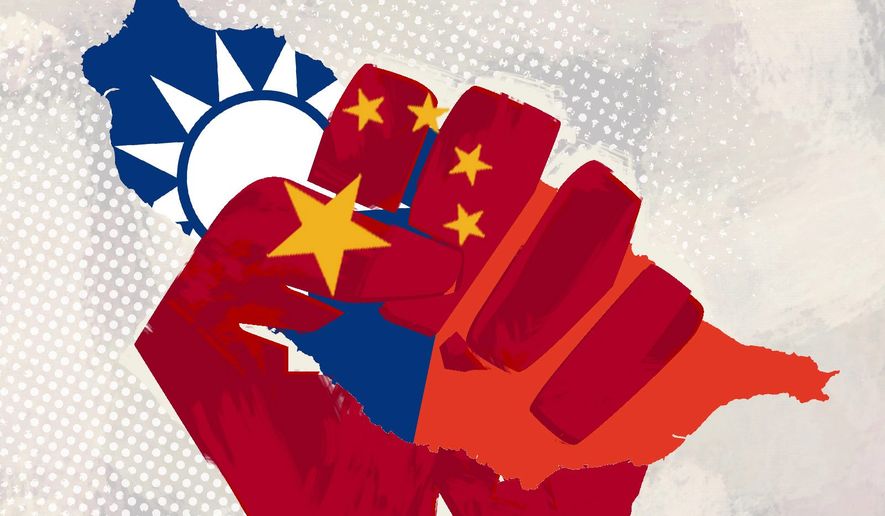OPINION:
In June 1948, in an effort to bring Berlin to its knees, the Soviets closed off all ground access to the city. In response, the United States and Great Britain — realizing the psychological and strategic importance of Berlin to both Europe and the world — launched the Berlin Airlift, an epic and ultimately successful endeavor to supply the city entirely by air. After 11 long months, the Soviets acknowledged defeat and gave up on the blockade.
In our own time, we face a close analogy in the island nation of Taiwan.
The Communist Chinese insist that Taiwan is part of China. The Taiwanese insist they are an independent nation. The rest of the world has, in varying degrees, humored the communists by pretending that their claims about Taiwan are legitimate.
Unfortunately for everyone, the days of being able to finesse the question of Taiwan are coming to a close — just as the days of finessing the question of Berlin came to a close in the wake of the construction of the Berlin Wall in August 1961, not coincidentally done on the watch of a newly minted Democratic president in the United States.
Taiwan is the key to the Pacific region. A Chinese assault on the island would compel everyone — the United States, Australia, Japan, the Philippines, New Zealand — to take sides and to take action. Or, alternatively, to surrender the Pacific to the Chinese communists.
Just as Berlin was crucial to control of the middle of Europe and consequently the world in 1948, so Taiwan is crucial to the Pacific and the world in 2021.
Earlier this week, Japanese Deputy Prime Minister Taro Aso said that in the event of a Chinese assault on Taiwan, “Japan and the U.S. must defend Taiwan together.” Mr. Aso knows that a loss of Taiwan would place Tokyo squarely in the sights of the communists in China.
He is, of course, correct. If we are unable or unwilling to defend Taiwan, it is unlikely that we will be able or willing to defend Japan.
This is not idle speculation. As recently as last week, the Chinese communist-controlled publication Naval and Merchant Ships outlined with some specificity (including weapons to be used) a possible three-stage plan for a military invasion of Taiwan. President Xi Jinping has, as part of the 100th anniversary of the Chinese Communist Party, made it clear that “reunification” is one of his top priorities.
The loss of Taiwan would send the Philippines and Indonesia — which are already wobbly because of their economic relationships — toward the Chinese communist orbit. It almost certainly would require the Japanese to remilitarize and acquire nuclear weapons.
Is Team Biden ready for such a thing?
It seems unlikely. They are having trouble responding with clarity and strength to a handful of Russian hackers operating with the tacit approval of the Russian government. President Biden was reduced to giving Russian President Vladimir Putin a list of sectors that he wished the Russians would avoid.
Team Biden is also caught up in a romanticized version of the relevance of the NATO alliance. The idea that NATO allies are going anywhere to help us fight anyone is quaint, and, like cavalry charges in the early days of World War II, misguided and perhaps fatal to those who believe in it.
The United States’ most important alliance right now is the Quad, a confederation of India, the U.S., Australia and Japan directed at providing a counterbalance to Communist China in the Pacific region.
This association was restarted by former Secretary of State Mike Pompeo, who himself has real world experience with potential regional and global hegemons. He led a platoon at the Fulda Gap — the narrowest strip of West Germany between East Germany and France — thought to be the place most likely to be invaded by the Soviets in the 1960s, ‘70s and ‘80s.
Mr. Pompeo saw and sees with clarity the risk posed to Taiwan by communist China. Restarting the Quad is the most sensible and prudential foreign policy move made by the United States since the deployment of medium-range nuclear missiles in Europe in the mid-1980s.
For the United States especially, the risk posed by communist China is complicated by our numerous and unfortunate commercial relationships. People, companies and organizations as disparate as John Cena, Apple and the NBA have repeated or are inclined to accept and repeat propaganda from communist China. Even the Biden administration is preparing to embark on an energy policy that would trade our current energy independence (or, if you prefer, our status as an exporter of energy) for dependence on communist China for batteries both for electric vehicles and utilities.
We have been playing the wrong game with communist China for too long.
Presidents Truman and Kennedy and every postwar president came to understand, prepare for, and minimize the risk posed by the Soviet Union. Let’s hope that in our current moment, our leaders can come to understand that strength, clarity of purpose, and clear understandings about our intentions are essential.
With respect to Beijing, that starts with resolve to defend Taiwan.
• Michael McKenna, a columnist for The Washington Times, is the president of MWR Strategies. He was most recently a deputy assistant to President Trump and deputy director of the Office of Legislative Affairs at the White House.




Please read our comment policy before commenting.